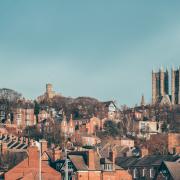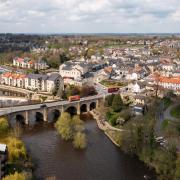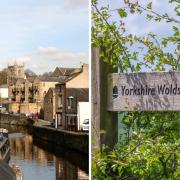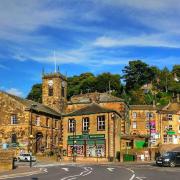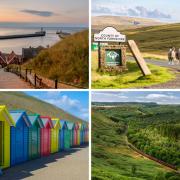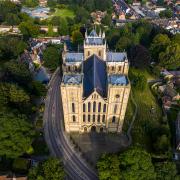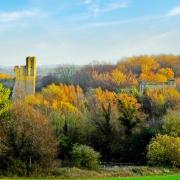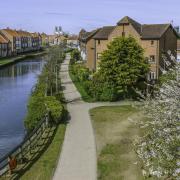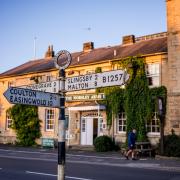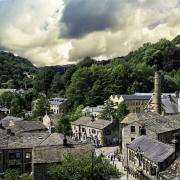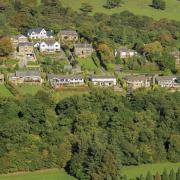Jo Haywood travels to one of West Yorkshire's busiest towns to visit a very special centenarian Photographs: Sam Atkins and Leo Rosser
IF you reach your 100th birthday, you expect one heck of a party. You would be very lucky, however, to receive a civic concert, a talk by a best-selling author, a video message from a celebrity gardener and a musical medley by a pair of British jazz greats.
All this and more is happening in Ilkley from April 17th to 19th when the town celebrates the centenary of its town hall, library and assembly rooms, known as King's Hall. 'It promises to be a weekend of celebration for everyone,' said Alex Cockshott of Ilkley Civic Society. 'It's not often you get the opportunity to come together as a town for such an important occasion. In this case, it's just once every 100 years!'
At the end of the 19th century, when talk of a town hall raised from a whisper to a roar, Ilkley was a fashionable, affluent town on the southern edge of the Yorkshire Dales. It was a thriving spa resort attracting visitors from across the country and was growing in wealth, prestige and prominence year on year. But it didn't have the accoutrements of a top town: a town hall, a free library and an assembly hall. 'The town, as always, was split,' said Alex. 'Half thought Ilkley needed its own town hall to show once and for all that it was no longer a village but a significant force to be reckoned with in the county.
The other half didn't want to pay for it.' A plot of land came up for auction on Station Road. Sedbergh House, a dilapidated farm dwelling surrounded by collapsing outbuildings, was snapped up by John Thomas Jackson, a wealthy businessman and local politician, who then sold the site on to Ilkley Urban District Council. A competition was launched to find the best design for an integrated library, town hall and assembly hall complex. Architect William Bakewell of Park Square, Leeds, pipped 59 other competitors to the post. 'Local people didn't really get a say, the councillors chose for them,' Alex explained. 'Luckily, they chose well and the solid Edwardian elegance of the building has stood the test of time. 'It has been flexible enough to change with the times but, with its domed lantern lights, dark wood panelling and sweeping arches, it has also retained its indomitable character.' Scottish industrialist Andrew Carnegie, who gave away a staggering �350 million in his lifetime, provided �3,000 to fund Ilkley's new library, leaving the council to find the remaining �10,000 for the town hall and neighbouring assembly rooms.
The library was opened in 1907 (even though it wasn't actually finished until 1908) by the Reverend Dr Robert Collyer, who had been an apprentice blacksmith in Ilkley before finding international fame as a preacher in New York. And the town hall was opened on April 27th in 1908 by John Thomas Jackson, who had laid the foundation stone two years earlier. To celebrate, the townspeople got a half-day paid holiday and free tickets to see the musical comedy The Belle Of Mayfair, which had travelled to the town after playing to packed houses at the Vaudeville Theatre, London. They won't be getting a holiday to celebrate the centenary, but they are getting a weekend of concerts, exhibitions, talks (most notably by former Ilkley schoolgirl turned saucy novelist Jilly Cooper) and a special performance by Cleo Laine and John Dankworth. Alan Titchmarsh, one of Ilkley's most famous sons, won't be able to attend the celebrations in person because he's being made (crowned?) the high sheriff of the Isle of Wight that weekend. But he will be sending a video message.
The people of Ilkley have more than just an elegant old town hall to celebrate though. The modern town is absolutely thriving. It's a haven for shoppers with its vast range of independent stores, cafes, delicatessens and boutiques. And walkers get a good deal too from the surrounding moorland, with Nidderdale to the north and the Dales National Park to the west.
One of the town's strengths is that it continues to retain its distinct character and individuality despite the creeping spread of both Bradford and Leeds. It comes under the auspices of the Bradford authority and has a Leeds postcode, but it is still very much a town apart. 'We don't want to be part of anywhere really,' said Alex Cockshott. 'The bigger cities might think they call the shots, but we are a very proud town with a proud heritage. That is definitely something worth celebrating.'



